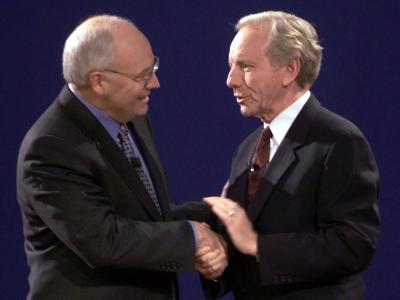|
|
|
World Trade Organization's Services Negotiations Threaten Democracy (Photo shows Democratic vice presidential candidate Sen. Joseph Lieberman, right, and Republican vice presidential candidate Dick Cheney shake hands before their debate Thursday, Oct. 5, 2000, in Danville, Ky. Photo by Al Behrman (AP)) Despite the dramatic breakdown of global trade talks in Seattle in December 1999, sweeping negotiations are now quietly underway in Geneva to subject an ever-greater degree of democratic decision-making to oversight by the World Trade Organization (WTO). Which unfortunately, happens to be headed by a New Zealand citizen, Mike Moore. These negotiations are aimed at expanding the General Agreement on Trade in Services (or GATS). The GATS is currently being re-negotiated behind closed doors in close consultation with international corporate lobbyists. "This agreement is designed to help transnational service corporations constrain and override democratic governance," trade specialist Scott Sinclair concludes in a new study for the Canadian Centre for Policy Alternatives. The study exposes the WTO "services" agreement to critical public scrutiny for the first time. It describes how the GATS' ultimate purpose is to commercialize every service sector in every WTO member country - including essential public services such as education, water and health care. The GATS, Sinclair points out, is not confined to cross-border trade in services. He shows how an expanded GATS threatens domestic and international regulation to protect the environment, conserve natural resources, and provide universal public services. The book also analyzes how the existing GATS has already played a pivotal role in several important WTO disputes, such as the recent ruling that struck down the Canada-U.S. Auto Pact. "The rulings in these cases," says Sinclair, "show that the GATS can be used to challenge an almost unlimited range of government regulatory measures that, even indirectly or unintentionally, affect the conditions of competition of international service suppliers." Despite its importance, very few Canadians including politicians know or understand the GATS, let alone its planned expansion. "They have a lot of catching-up to do." says Sinclair. Scott Sinclair is a Canadian trade policy specialist with extensive international trade policy expertise and experience. He has advised several Canadian provincial and territorial governments, including five years as a senior trade policy advisor to the Government of British Columbia. He is currently a senior research associate at the Canadian Centre for Policy Alternatives.. . . . .nd to poverty. These foot-soldiers are mobilisi |

